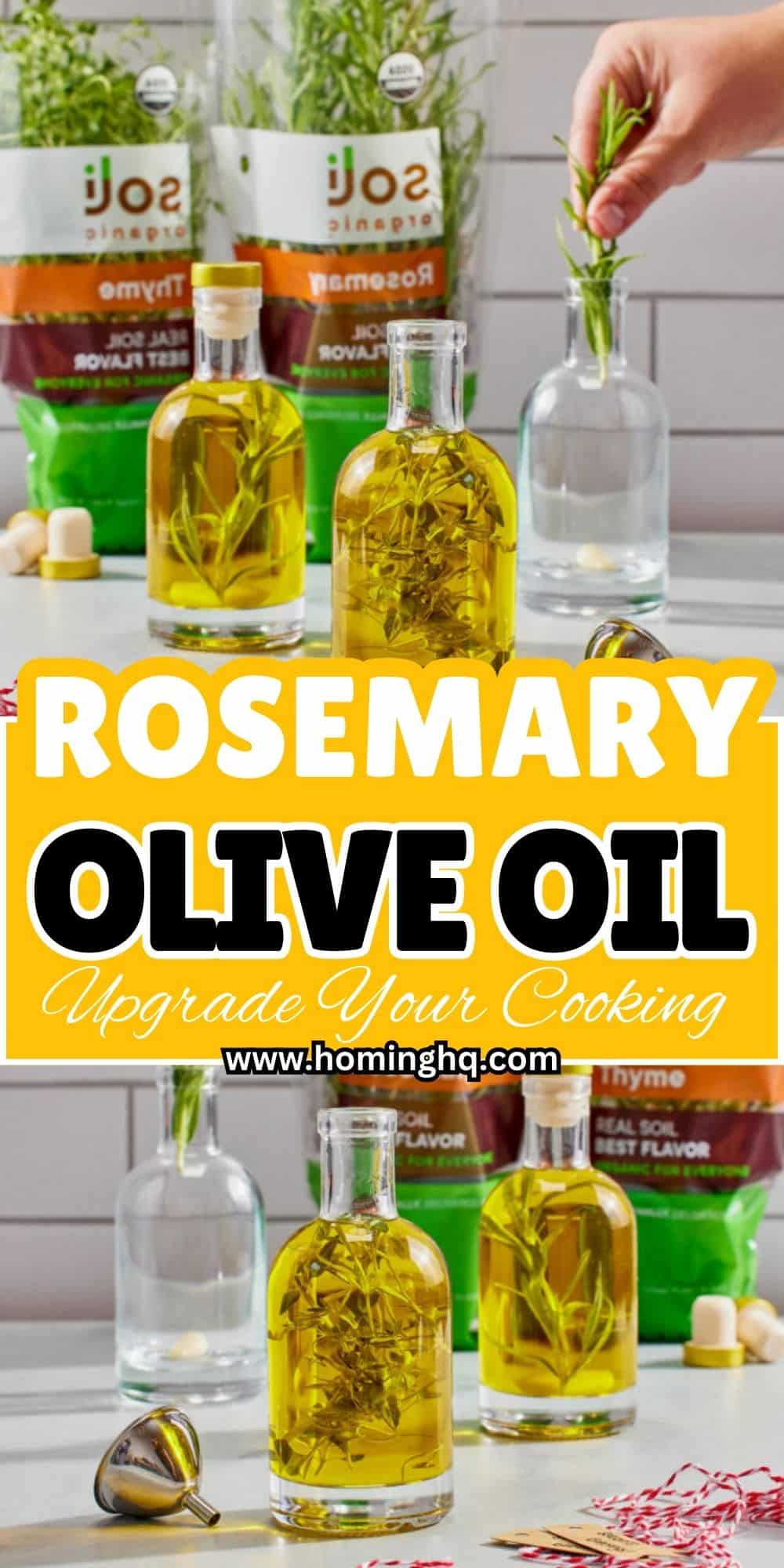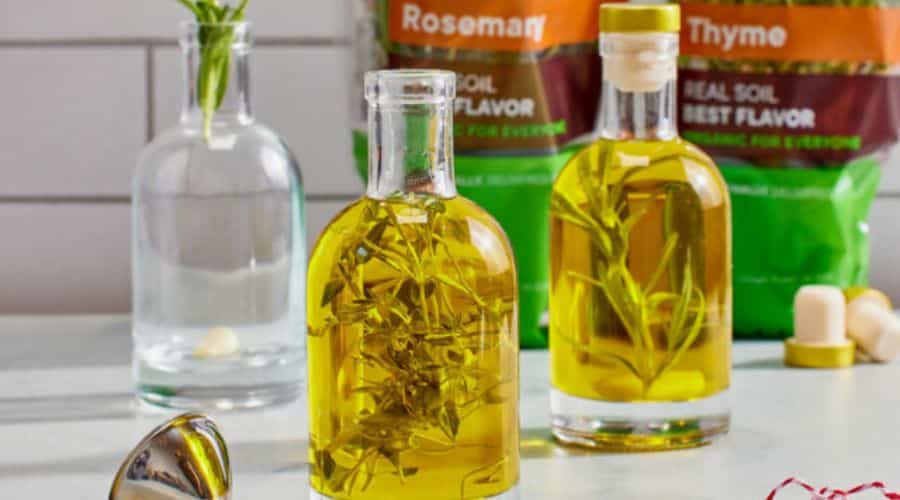All products are selected by our editorial team for quality. If you buy through our links, we may earn a small commission at no extra cost to you.
Rosemary olive oil is a flavorful and aromatic fusion of two simple ingredients: fresh rosemary and high-quality olive oil.
This herb-infused oil is becoming a kitchen staple due to its versatility and the depth of flavor it adds to a wide range of dishes.
Whether used in cooking, as a dressing, or simply as a dip, rosemary olive oil enhances the taste with a fragrant, earthy twist.
It’s also packed with numerous health benefits, making it not only a tasty addition but also a nutritious one.
In this post, we’ll explore what makes rosemary olive oil special, how to use it in your kitchen, and why it should be a must-have in your pantry.

What Is Rosemary Olive Oil?
Rosemary olive oil is an infusion of fresh rosemary sprigs into olive oil.
The process allows the robust flavor of rosemary to blend with the smooth richness of olive oil, creating a unique and fragrant oil perfect for various culinary applications.
There are different ways to make this infused oil, but the traditional method involves gently heating olive oil and adding fresh rosemary sprigs.
The warmth of the oil helps release the oils from the rosemary, allowing the herb’s essential oils to blend into the olive oil.
You can also customize your rosemary olive oil by adding other ingredients like garlic or lemon zest for an even more complex flavor profile.
The resulting oil can be used in many dishes, adding a subtle yet bold flavor that elevates everyday meals.
Why Rosemary Olive Oil is a Must-Have in Your Kitchen
Rosemary olive oil is an essential ingredient for any home cook due to its versatility and rich flavor.
The blend of rosemary’s piney, earthy notes with the smoothness of olive oil makes it an excellent addition to various recipes.
Whether you’re roasting vegetables, grilling meats, or dressing a salad, rosemary olive oil brings a fragrant, herby flavor that enhances the overall dish.
The subtle bitterness of the olive oil perfectly complements the aromatic rosemary, creating a balance that’s both savory and refreshing.
Beyond taste, rosemary olive oil also boasts several health benefits.
Olive oil itself is known for its heart-healthy fats, antioxidants, and anti-inflammatory properties.
Rosemary adds its own benefits, including improving digestion, reducing inflammation, and boosting memory.
Together, they form a powerhouse ingredient that not only enhances your meals but supports your overall well-being.
Incorporating rosemary olive oil into your kitchen is a simple yet effective way to elevate your cooking while also enjoying the many health advantages it offers.
How to Make Homemade Rosemary Olive Oil

Making your own rosemary olive oil at home is incredibly easy and allows you to control the flavor and quality of the ingredients.
Ingredients You’ll Need
- Fresh rosemary sprigs
- High-quality extra virgin olive oil
- Optional: garlic or lemon zest for extra flavor
Step-by-Step Instructions
- Start by washing the rosemary sprigs thoroughly and patting them dry. It’s important to remove any moisture to prevent spoilage.
- Heat the olive oil in a saucepan over low heat. Do not let the oil get too hot; it should be warm enough to release the flavors from the rosemary, but not boiling.
- Add the rosemary sprigs to the oil and let them steep for about 10 to 15 minutes. Stir occasionally to ensure the rosemary infuses evenly.
- After the rosemary has infused, remove the saucepan from the heat and let it cool for a few minutes.
- Strain the oil through a fine mesh strainer or cheesecloth into a clean bottle or jar to remove the rosemary sprigs.
- Optional: You can add garlic cloves or lemon zest at this stage if you want to create a more complex flavor.
Storage Tips
Store your rosemary olive oil in an airtight container, preferably a dark glass bottle, to protect it from light.
Keep it in a cool, dark place for the best preservation.
Allow the oil to sit for about 1 to 2 weeks before using to allow the flavors to fully infuse.
Health Benefits of Rosemary Olive Oil
Rosemary olive oil isn’t just a flavorful addition to your dishes; it also comes with a variety of health benefits.
Rich in Antioxidants
Olive oil, especially extra virgin olive oil, is packed with antioxidants that help protect the body from oxidative stress and cell damage.
Rosemary adds to this by also being rich in antioxidants, making this infused oil a potent source of compounds that can help reduce inflammation in the body.
Anti-inflammatory Properties
Both rosemary and olive oil are known for their anti-inflammatory effects.
Rosemary contains compounds like rosmarinic acid, which can help reduce inflammation and promote better overall health.
The healthy fats in olive oil also contribute to a reduction in inflammation, making rosemary olive oil beneficial for reducing the risk of chronic diseases like arthritis.
Supports Heart Health
The combination of olive oil’s monounsaturated fats and rosemary’s antioxidant properties makes rosemary olive oil a great choice for supporting heart health.
Regular consumption can help lower bad cholesterol levels and promote healthy blood circulation.
Improves Digestion
Rosemary has been traditionally used to help with digestion.
It can stimulate the production of bile, which helps break down fats and improve overall digestion.
When combined with olive oil, it can promote a healthy digestive system and ease stomach discomfort.
Boosts Memory and Cognitive Function
Rosemary has been linked to improved cognitive function and memory enhancement.
Its aroma alone has been shown to improve concentration and alertness.
By incorporating rosemary olive oil into your diet, you can reap the cognitive benefits of this powerful herb while enjoying the health benefits of olive oil.
Common Mistakes to Avoid When Making Rosemary Olive Oil
Making rosemary olive oil is a simple process, but there are a few common mistakes to avoid to ensure the best result.
Using Too Much Rosemary
One of the most common mistakes when making rosemary olive oil is using too much rosemary.
While rosemary has a bold flavor, adding too many sprigs can overpower the oil, making it bitter.
It’s important to find the right balance to create a subtle, fragrant infusion without overwhelming the taste.
Not Allowing Enough Infusion Time
Another mistake is not giving the oil enough time to infuse.
The flavors of rosemary need time to meld with the olive oil.
If you use the oil too soon, it may lack the depth of flavor you’re looking for.
Allow at least 1 to 2 weeks of infusion time for the best result.
Overheating the Olive Oil
When heating the olive oil, it’s essential to keep the temperature low.
If the oil gets too hot or starts to boil, it can degrade the quality of the oil and destroy some of the beneficial compounds in both the olive oil and rosemary.
Not Straining Properly
After infusing the rosemary, make sure to strain the oil properly to remove all the rosemary sprigs and any other debris.
Leaving pieces of rosemary in the oil can cause it to go rancid faster.
Not Storing the Oil Correctly
Proper storage is key to maintaining the quality of your rosemary olive oil.
Always store the oil in an airtight container, preferably a dark glass bottle, and keep it in a cool, dark place to avoid oxidation and spoilage.
Conclusion
Rosemary olive oil is a versatile and aromatic addition to any kitchen.
It’s easy to make, packed with flavor, and offers a range of health benefits.
From cooking to dressing salads, or simply dipping bread, this herb-infused oil can elevate almost any dish.
By following the simple steps to make it at home and avoiding common mistakes, you can enjoy a fresh, high-quality rosemary olive oil that enhances both the taste and healthfulness of your meals.
Add this delightful ingredient to your kitchen today, and explore the many ways it can transform your cooking.
Frequently Asked Questions
1. How long does rosemary olive oil last?
Rosemary olive oil can last up to 1-2 months if stored properly in an airtight container in a cool, dark place.
To extend its shelf life, make sure the rosemary is fully dry before adding it to the oil.
2. Can I use dried rosemary to make rosemary olive oil?
While fresh rosemary is preferred, you can use dried rosemary.
However, fresh rosemary tends to infuse the oil with a more vibrant, aromatic flavor.
3. Can I use rosemary olive oil for frying?
Although rosemary olive oil adds great flavor to many dishes, it’s not recommended for frying due to its low smoking point.
Use it as a finishing oil or in cooking at lower temperatures.
4. Can I add other herbs to my rosemary olive oil?
Yes, you can! Adding herbs like thyme, oregano, or basil can give your oil a unique flavor.
Just make sure to adjust the amount of rosemary to ensure it doesn’t overpower the other herbs.
5. Does rosemary olive oil have any skincare benefits?
Yes, rosemary olive oil can be beneficial for the skin.
The antioxidants and anti-inflammatory properties in rosemary and olive oil can help promote healthy skin by reducing signs of aging and inflammation.
You can use it as a natural moisturizer or massage it into your skin.

Rosemary Olive Oil
Equipment
- 1 Medium saucepan (for heating olive oil)
- 1 Fine mesh strainer or cheesecloth (for straining the oil)
- 1 Clean glass jar or bottle (for storing)
- 1 Spoon (For stirring)
Ingredients
- 1 cup 240 ml Extra virgin olive oil
- 3-4 sprigs Fresh rosemary
- Optional: 1-2 cloves Garlic peeled, for added flavor
- Optional: 1 teaspoon Lemon zest for a citrusy touch
Instructions
- Prepare Rosemary: Rinse the fresh rosemary sprigs and pat them dry with a paper towel to remove any excess moisture.
- Heat Olive Oil: Pour the olive oil into a medium saucepan and heat over low heat. Be careful not to let it get too hot—just warm enough to infuse the rosemary.
- Infuse Rosemary: Add the rosemary sprigs (and optional garlic and lemon zest) to the oil. Let them steep for 10 to 15 minutes, stirring occasionally to ensure the rosemary is evenly distributed.
- Cool the Oil: Once the oil has infused with the rosemary’s flavor, remove the saucepan from the heat and let the oil cool for a few minutes.
- Strain the Oil: Using a fine mesh strainer or cheesecloth, strain the oil into a clean bottle or jar, removing all solid pieces.
- Store: Seal the jar or bottle tightly and store the rosemary olive oil in a cool, dark place for up to 1-2 weeks to allow the flavors to deepen.
Notes
- Infusion Time: For a stronger rosemary flavor, you can allow the oil to infuse for up to 2 weeks.
- Storage: Always store rosemary olive oil in a dark, airtight container to preserve its flavor and prevent oxidation. Use within 1-2 months for the best taste.
- Customization: Feel free to add other herbs like thyme or oregano for a different flavor profile. You can also try adding chili flakes for a spicy kick.

